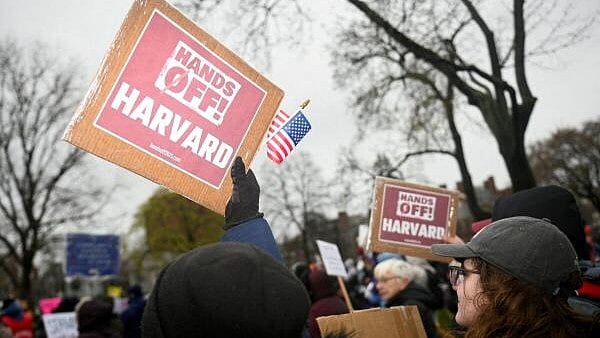
Demonstrators rally on Cambridge Common in a protest organized by the City of Cambridge calling on Harvard leadership to resist federal government interference at the university in Cambridge, Massachusetts.
Credit: Reuters Photo
Harvard University received an emailed letter from the Trump administration last Friday that included a series of demands about hiring, admissions and curriculum so onerous that school officials decided they had no choice but to take on the White House.
The university announced its intentions Monday, setting off a tectonic battle between one of the country’s most prestigious universities and a US president. Then, almost immediately, came a frantic call from a Trump official.
The April 11 letter from the White House’s task force on antisemitism, this official told Harvard, should not have been sent and was “unauthorized,” two people familiar with the matter said.
The letter was sent by the acting general counsel of the Department of Health and Human Services, Sean Keveney, according to three other people, who were briefed on the matter. Keveney is a member of the antisemitism task force.
It is unclear what prompted the letter to be sent last Friday. Its content was authentic, the three people said, but there were differing accounts inside the administration of how it had been mishandled. Some people at the White House believed it had been sent prematurely, according to the three people, who requested anonymity because they were not authorized to speak publicly about internal discussions. Others in the administration thought it had been meant to be circulated among the task force members rather than sent to Harvard.
But its timing was consequential. The letter arrived when Harvard officials believed they could still avert a confrontation with President Donald Trump. Over the previous two weeks, Harvard and the task force had engaged in a dialogue. But the letter’s demands were so extreme that Harvard concluded that a deal would ultimately be impossible.
After Harvard publicly repudiated the demands, the Trump administration raised the pressure, freezing billions in federal funding to the school and warning that its tax-exempt status was in jeopardy.
A senior White House official said the administration stood by the letter, calling the university’s decision to publicly rebuff the administration overblown and blaming Harvard for not continuing discussions.
“It was malpractice on the side of Harvard’s lawyers not to pick up the phone and call the members of the antisemitism task force who they had been talking to for weeks,” said May Mailman, the White House senior policy strategist. “Instead, Harvard went on a victimhood campaign.”